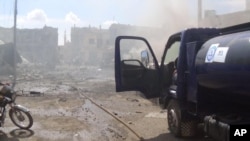“Tell Barack Obama, tell Russia, tell Iran that too many people are dying every day,” said Hani, a first grade teacher from Syria, as he awaited entry to a refugee camp in Croatia in late September. “Too many people.”
Over the following week, aerial bombardments by the U.S.-led coalition continued in Syria as Hani trudged toward Germany, trying to leave the chaos behind. But rather than slowing, the war has only expanded with Russia entering the fray.
Russia says its only goal is to attack what it calls terrorists in Syria, and it has no intention of fighting for the government of President Bashar al-Assad. But if Russia targets opposition groups or rebels, security analysts say, regional forces like Saudi Arabia will also deepen their involvement in the increasingly international war.
"The goal is terrorism and we are not supporting anyone against their own people,” Russian Foreign Minister Sergei Lavrov said at a press conference in New York on Thursday. “We fight terrorism."
Rebels or terrorists
But in Syria, classifying “people” and “terrorists” depends on who you ask. Many opponents of the government distinguish between militant groups calling some “opposition” or “rebels” and others “terrorists.”
The Assad government and its backers — along with others disenchanted by every group with guns in Syria — often refer to all militant groups as "terrorists." Russia is one of Assad’s most staunch allies.
“From the Syrian perspective and the Russian perspective, all groups that are fighting the regime are potential targets for airstrikes,” said Musa Shteiwi, the director of the Centre for Strategic Studies at the University of Jordan. “The priority might be for the big ones.”
The “big ones,” he said, include Islamic State militants and al-Qaida affiliates like the al-Nusra Front.
Many of the other groups fighting the government are believed to be either supported by or allied with Saudi Arabia, long one of Assad’s enemies. Saudi Arabia has demanded that Russia halt airstrikes, saying they are hitting civilians in opposition cities.
In the coming days, if Russian involvement begins to clearly favor the Assad government, Shteiwi says that Saudi Arabia and other Gulf countries will feel obliged to step in.
Expanding the war
Even without direct Saudi intervention, Russia’s involvement has already expanded the war, said Mustafa Alani, director of defense and security at the Gulf Research Center in Dubai.
“We have now four out of the five big powers that are part of the military operations in Syria,” he said. “We have Americans, the British, the French and now we have the Russians. The only one out of the five is the Chinese.”
With most world powers involved in the war, he says it could raise tensions in other regions, making the conflict an increasingly global concern.
“The Syrian conflict was domestic, [but] it moved to be regional and we’re talking about internationalization,” he said.
But Saudi Arabia may not be quick to act, due to being embroiled in conflict in Yemen. In the meantime, he added, Russia claims it is defending itself against its own nationals working with the Islamic State in Syria.
Russia also may have its own domestic limits: Russian people also haven’t forgotten the decade-long quagmire of Moscow's war in Afghanistan in the 1980s, and they are unlikely to support sustained military action in the Middle East, Alani said.
But for many Syrian civilians, additional military activity will just mean more bodies piling up as the various power-players vie for what’s left of their country.
“Everyone says they want to help Syria,” said Hani after several hours in line. “It’s only talk.”





